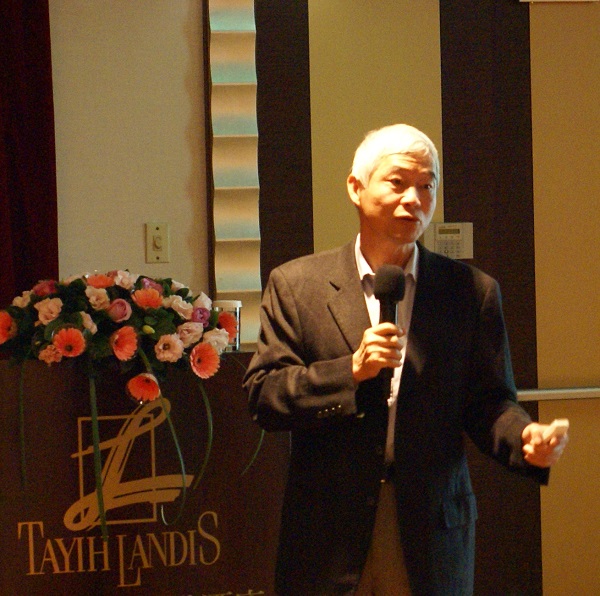Director He-Chen Tan Talked Corporate Sustainability, The Southern Spirits and Green Actions at Yi Tsai Club

2015/01/13
Heng Ya Electric (Kunshan) Limited, a member of Ta Ya Group, has obtained carbon footprint certificate for magnet wires ahead of local peers, and was commended by Kunshan City Government with a Certificate of Low-Carbon Pioneer. This was also Ta Ya Group's third product to be certified for carbon footprint, after the 161kV cross-linked PE power cable and the triple insulation cable.
On June 30, Kunshan City Government and Taiwan Electrical and Electronic Manufacturers' Association (TEEMA) jointly held a Carbon Footprint and Carbon Credit Management Forum at Huaqiao International Expo Center, Kunshan City, to present Certificate of Low-carbon Pioneer to businesses that have obtained product carbon footprint certificates. On behalf of Heng Ya Electric (Kunshan), Production Department Manager Fang Yuanqin received the certificate from Deputy Director Zhang Wei of Kunshan Environmental Protection Office and Division head Yu Jie of China Quality Certification Center (CQC). The product being certified for carbon footprint this time round was nylon-coated PE Litz type enameled copper wire (2U+NY0.10*25C), which is what Heng Ya is renowned for. Prior to the certification, TEEMA made arrangements to have Industrial Technology Research Institute conduct on-site consultation in October 2014. The actual product carbon footprint inspection was performed by CQC according to ISO TS 14067 standards on April 16, 2015. The inspection found: 43.97kg of carbon footprint for every reel (4.5kg) of products produced; raw materials accounted for 54.8% while the production process accounted for 46.2% of carbon footprint. This was also the first carbon footprint certificate to be issued among local magnet wire producers.
Ta Ya has always been conscious about environmental protection. In support of the group's initiatives, Heng Ya (Kunshan) has adopted a new energy-efficient heat-recycling furnace and Europe's most advanced INLINE production equipment to replace conventional machinery. These changes not only increased product output, but also reduced electricity costs and lowered exhaust temperature at the same time. Carbon footprint inspections are just the beginning steps. In the future, Heng Ya will aim to improve every key stage of the production process to minimize energy consumption and carbon emission.

"Yi Tsai Club," an assembly of elite entrepreneurs and professional managers in Tainan, invited TAYA Pristine Homeland foundation Director He-Chen Tan to deliver speech at an event held in the evening of the 9th. Director He-Chen gave a speech on "Southern Spirits and Green Action" that highlighted the local characters and diverse cultures of the southern spirit. He then encouraged the audience to adopt green actions through compassion and anchor the concept of sustainability deep within Tainan.
President Shen San-Yi of Ta Ya Electric Wire and Cable Co., Ltd., who is also the current Yi Tsai Club chairman, said in his speech: "Corporate social responsibility has become the mainstream value. Businesses are now required to minimize wastage and avoid creating burden to the next generation."
According to Director He-Chen, the southern spirit represents an emphasis on local values, diversity and human culture, as opposed to the materialistic spirits found in northern parts of the nation. This comparison between the north and the south is merely a relative description, and we are starting to see a reversal of this north/south divide whether in Taiwan or the world as a whole. As we face the worldwide climate change and disorder of the financial system, it is crucial to engage northern and southern regions in more active communication, and accept our local characters and diverse cultures as the common value with the help of the Internet. In the meantime, we are seeing a shift in industries. Industries that are associated with people, the environment and networking are emerging at the expense of others. Apart from technological evolution, we are seeing critical changes in business model as well, for example: business owners are starting to satisfy customers' taste and not just their demand for quality, while employers are being forced to attract talents through corporate social responsibility actions.
Care for the disadvantaged and environmental protection are the two common corporate social responsibility practices adopted by businesses, because they are the quickest way to create motivating stories that have the benefit of enhancing one's brand image. Corporate social responsibility is an ongoing effort. Whether the effort is associated with the business itself or the product, it is undeniable that a business would move more quickly if it is perceived as a welcomed neighbor to the local residents.
In response to the recent issue on water rationing and fallowing, Director He-Chen presented a different view using residential water tanks as an example. The water company tends to supply water at reduced pressure in an attempt to avoid leakage, whereas residents try to increase water pressure by installing private water tanks. The existence of water tank eliminates people's sense of urgency towards potential water shortage. This, combined with prolonged underpricing of water, resulted in people's lack of awareness to our finite water supply. In contrast, more than half of farms in Tainan are able to escape the fate of fallowing, thanks to the water-saving efforts of several disciplined controllers. The key to sustainability is disciplined management, not infrastructure. However, the Taiwanese people tend to adopt construction as a solution without fully understanding what is needed.
In the end, Director He-Chen concluded his speech by envisioning Tainan "a place to dream, work, love, settle, and live in peace."

